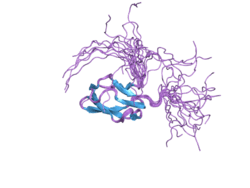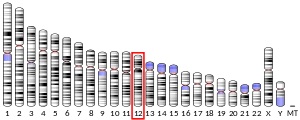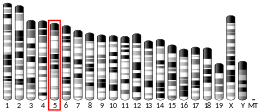ACACB
Acetyl-CoA carboxylase 2 also known as ACC-beta or ACC2 is an enzyme that in humans is encoded by the ACACB gene.[5][6]
Function
Acetyl-CoA carboxylase (ACC) is a complex multifunctional enzyme system. ACC is a biotin-containing enzyme which catalyzes the carboxylation of acetyl-CoA to malonyl-CoA, the rate-limiting step in fatty acid synthesis. ACC-beta is thought to control fatty acid oxidation by means of the ability of malonyl-CoA to inhibit carnitine palmitoyltransferase I, the rate-limiting step in fatty acid uptake and oxidation by mitochondria. ACC-beta may be involved in the regulation of fatty acid oxidation, rather than fatty acid biosynthesis.[5]
Clinical implications
Human acetyl-CoA carboxylase has recently become a target in the design of new anti-obesity drugs.[7] However, when the gene for ACC2 was knocked out in mice, no change in body weight was observed relative to normal mice.[8] This result suggests inhibition of ACC2 by drugs may be an ineffective method of treating obesity.
References
- GRCh38: Ensembl release 89: ENSG00000076555 - Ensembl, May 2017
- GRCm38: Ensembl release 89: ENSMUSG00000042010 - Ensembl, May 2017
- "Human PubMed Reference:". National Center for Biotechnology Information, U.S. National Library of Medicine.
- "Mouse PubMed Reference:". National Center for Biotechnology Information, U.S. National Library of Medicine.
- "Entrez Gene: acetyl-Coenzyme A carboxylase beta".
- Widmer J, Fassihi KS, Schlichter SC, Wheeler KS, Crute BE, King N, Nutile-McMenemy N, Noll WW, Daniel S, Ha J, Kim KH, Witters LA (June 1996). "Identification of a second human acetyl-CoA carboxylase gene". The Biochemical Journal. 316 ( Pt 3) (3): 915–22. doi:10.1042/bj3160915. PMC 1217437. PMID 8670171.
- Corbett JW, Harwood JH (November 2007). "Inhibitors of mammalian acetyl-CoA carboxylase". Recent Patents on Cardiovascular Drug Discovery. 2 (3): 162–80. doi:10.2174/157489007782418928. PMID 18221116.
- Olson DP, Pulinilkunnil T, Cline GW, Shulman GI, Lowell BB (April 2010). "Gene knockout of Acc2 has little effect on body weight, fat mass, or food intake". Proceedings of the National Academy of Sciences of the United States of America. 107 (16): 7598–603. Bibcode:2010PNAS..107.7598O. doi:10.1073/pnas.0913492107. PMC 2867727. PMID 20368432.
Further reading
- Cheng D, Chu CH, Chen L, Feder JN, Mintier GA, Wu Y, Cook JW, Harpel MR, Locke GA, An Y, Tamura JK (January 2007). "Expression, purification, and characterization of human and rat acetyl coenzyme A carboxylase (ACC) isozymes". Protein Expression and Purification. 51 (1): 11–21. doi:10.1016/j.pep.2006.06.005. PMID 16854592.
- Diaz FJ, Meary A, Arranz MJ, Ruaño G, Windemuth A, de Leon J (December 2009). "Acetyl-coenzyme A carboxylase alpha gene variations may be associated with the direct effects of some antipsychotics on triglyceride levels". Schizophrenia Research. 115 (2–3): 136–40. doi:10.1016/j.schres.2009.09.038. PMC 2784140. PMID 19846279.
- Madauss KP, Burkhart WA, Consler TG, Cowan DJ, Gottschalk WK, Miller AB, Short SA, Tran TB, Williams SP (May 2009). "The human ACC2 CT-domain C-terminus is required for full functionality and has a novel twist". Acta Crystallographica Section D. 65 (Pt 5): 449–61. doi:10.1107/S0907444909008014. PMC 2725780. PMID 19390150.
- Kahn BB, Alquier T, Carling D, Hardie DG (January 2005). "AMP-activated protein kinase: ancient energy gauge provides clues to modern understanding of metabolism". Cell Metabolism. 1 (1): 15–25. doi:10.1016/j.cmet.2004.12.003. PMID 16054041.
- de Leon J, Correa JC, Ruaño G, Windemuth A, Arranz MJ, Diaz FJ (January 2008). "Exploring genetic variations that may be associated with the direct effects of some antipsychotics on lipid levels". Schizophrenia Research. 98 (1–3): 40–6. doi:10.1016/j.schres.2007.10.003. PMID 18031993.
- Kreuz S, Schoelch C, Thomas L, Rist W, Rippmann JF, Neubauer H (September 2009). "Acetyl-CoA carboxylases 1 and 2 show distinct expression patterns in rats and humans and alterations in obesity and diabetes". Diabetes/Metabolism Research and Reviews. 25 (6): 577–86. doi:10.1002/dmrr.997. PMID 19618481.
- Castle JC, Hara Y, Raymond CK, Garrett-Engele P, Ohwaki K, Kan Z, Kusunoki J, Johnson JM (2009). Zanger U (ed.). "ACC2 is expressed at high levels in human white adipose and has an isoform with a novel N-terminus [corrected]". PLOS One. 4 (2): e4369. doi:10.1371/journal.pone.0004369. PMC 2629817. PMID 19190759.
- Højlund K, Mustard KJ, Staehr P, Hardie DG, Beck-Nielsen H, Richter EA, Wojtaszewski JF (February 2004). "AMPK activity and isoform protein expression are similar in muscle of obese subjects with and without type 2 diabetes". American Journal of Physiology. Endocrinology and Metabolism. 286 (2): E239-44. doi:10.1152/ajpendo.00326.2003. PMID 14532170.
- Barbe L, Lundberg E, Oksvold P, Stenius A, Lewin E, Björling E, Asplund A, Pontén F, Brismar H, Uhlén M, Andersson-Svahn H (March 2008). "Toward a confocal subcellular atlas of the human proteome". Molecular & Cellular Proteomics. 7 (3): 499–508. doi:10.1074/mcp.M700325-MCP200. PMID 18029348.
- Szabo de Edelenyi F, Goumidi L, Bertrais S, Phillips C, Macmanus R, Roche H, Planells R, Lairon D (December 2008). "Prediction of the metabolic syndrome status based on dietary and genetic parameters, using Random Forest". Genes & Nutrition. 3 (3–4): 173–6. doi:10.1007/s12263-008-0097-y. PMC 2593021. PMID 19034549.
- Conde E, Suarez-Gauthier A, García-García E, Lopez-Rios F, Lopez-Encuentra A, García-Lujan R, Morente M, Sanchez-Verde L, Sanchez-Cespedes M (September 2007). "Specific pattern of LKB1 and phospho-acetyl-CoA carboxylase protein immunostaining in human normal tissues and lung carcinomas". Human Pathology. 38 (9): 1351–60. doi:10.1016/j.humpath.2007.01.022. PMID 17521700.
- Rosa G, Manco M, Vega N, Greco AV, Castagneto M, Vidal H, Mingrone G (November 2003). "Decreased muscle acetyl-coenzyme A carboxylase 2 mRNA and insulin resistance in formerly obese subjects". Obesity Research. 11 (11): 1306–12. doi:10.1038/oby.2003.177. PMID 14627750.
- Oh SY, Lee MY, Kim JM, Yoon S, Shin S, Park YN, Ahn YH, Kim KS (February 2005). "Alternative usages of multiple promoters of the acetyl-CoA carboxylase beta gene are related to differential transcriptional regulation in human and rodent tissues". The Journal of Biological Chemistry. 280 (7): 5909–16. doi:10.1074/jbc.M409037200. PMID 15590647.
- Locke GA, Cheng D, Witmer MR, Tamura JK, Haque T, Carney RF, Rendina AR, Marcinkeviciene J (July 2008). "Differential activation of recombinant human acetyl-CoA carboxylases 1 and 2 by citrate". Archives of Biochemistry and Biophysics. 475 (1): 72–9. doi:10.1016/j.abb.2008.04.011. PMID 18455495.
- Cho YS, Lee JI, Shin D, Kim HT, Jung HY, Lee TG, Kang LW, Ahn YJ, Cho HS, Heo YS (January 2010). "Molecular mechanism for the regulation of human ACC2 through phosphorylation by AMPK". Biochemical and Biophysical Research Communications. 391 (1): 187–92. doi:10.1016/j.bbrc.2009.11.029. PMID 19900410.
- Frøsig C, Jørgensen SB, Hardie DG, Richter EA, Wojtaszewski JF (March 2004). "5'-AMP-activated protein kinase activity and protein expression are regulated by endurance training in human skeletal muscle". American Journal of Physiology. Endocrinology and Metabolism. 286 (3): E411-7. doi:10.1152/ajpendo.00317.2003. PMID 14613924.
- Ruaño G, Bernene J, Windemuth A, Bower B, Wencker D, Seip RL, Kocherla M, Holford TR, Petit WA, Hanks S (February 2009). "Physiogenomic comparison of edema and BMI in patients receiving rosiglitazone or pioglitazone". Clinica Chimica Acta; International Journal of Clinical Chemistry. 400 (1–2): 48–55. doi:10.1016/j.cca.2008.10.009. PMID 18996102.
- Kim KW, Yamane H, Zondlo J, Busby J, Wang M (May 2007). "Expression, purification, and characterization of human acetyl-CoA carboxylase 2". Protein Expression and Purification. 53 (1): 16–23. doi:10.1016/j.pep.2006.11.021. PMID 17223360.
- Ruderman N, Prentki M (April 2004). "AMP kinase and malonyl-CoA: targets for therapy of the metabolic syndrome". Nature Reviews. Drug Discovery. 3 (4): 340–51. doi:10.1038/nrd1344. PMID 15060529.




